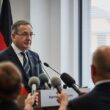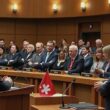Following the unsuccessful conclusion of United Nations negotiations for a global plastics treaty, members of the German Left Party parliamentary group have voiced criticism regarding the perceived lack of ambition demonstrated by the German government during the talks.
Mareike Hermeier, spokesperson for the circular economy, stated that Germany’s engagement within the negotiating group was “pale and without result” claiming that promising rhetoric was not translated into concrete, binding regulations.
Hermeier further argued that insufficient political will is also evident in the federal budget, noting the absence of dedicated funding for circular economy initiatives, recycling infrastructure and plans for a functional recycled materials market. She emphasized that domestic inaction undermines international credibility. “The German government’s task would have been to advocate for a strong agreement in Geneva, but it is too closely connected with the interests of corporations that profit from this crisis” she added.
Regarding the failure of the negotiations, Hermeier asserted that an agreement lacking binding limits on plastic production and comprehensive lifecycle regulations is effectively worthless. She attributed the outcome to the significant lobbying power of the petrochemical industry, which she claims outweighed considerations for human well-being, biodiversity and environmental protection.
Dirk Messner, President of the German Environment Agency (UBA), described the failed plastics treaty as a “sad day for the planet and humanity”. In comments to the “Handelsblatt” newspaper, Messner stated that a unique opportunity to reverse the global plastic pollution crisis has been lost, a development he characterized as negative for oceans, soils, food security and human health.
Messner indicated that a small number of countries obstructed the will of the “vast majority” of participating nations, warning that this missed opportunity will carry significant consequences for future generations. The United Nations has been working since 2022 to forge an international agreement aimed at curbing the growing tide of plastic waste, with the most recent round of negotiations concluding in Geneva on Friday morning without reaching a consensus.





